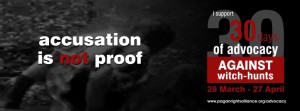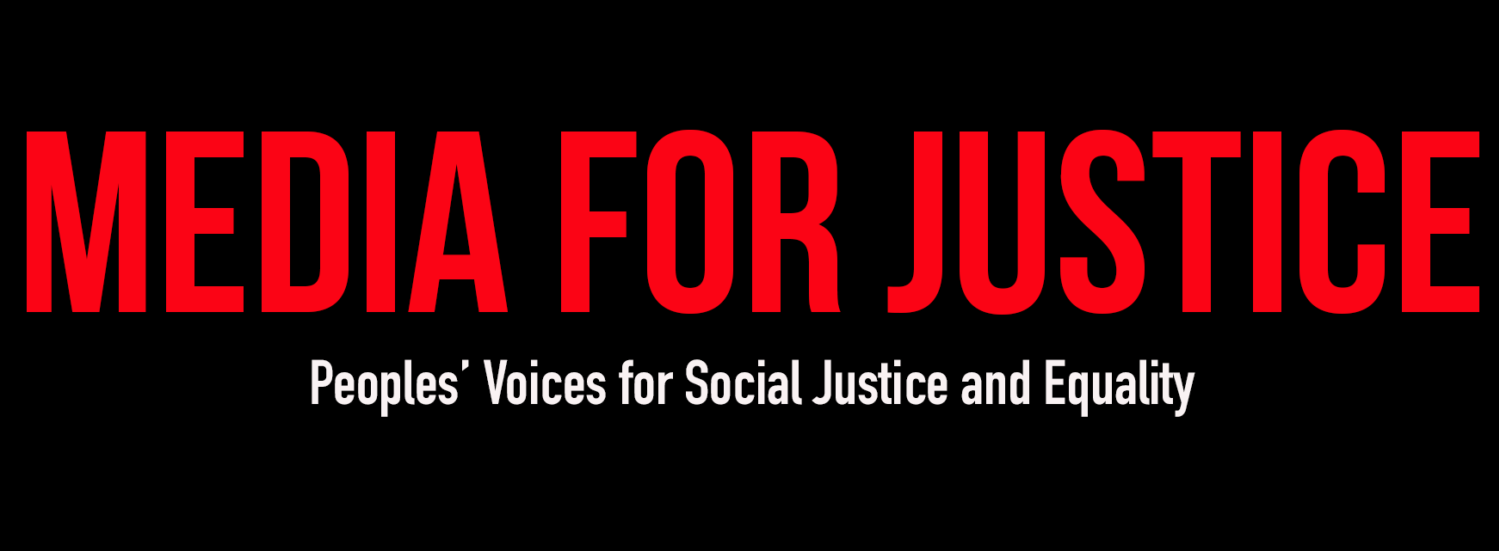By: Damon Leff
A recent MWEB radio advert and the response from City Press demonstrated how human rights abuses resulting from accusations of witchcraft in South Africa are dismissed in favour of profit and misleading headlines. [0]
The advert portrayed members of a mythical ‘coven of Gwadana Forest‘. The usual allegations against Witches are made – that Witchcraft is ipso-facto ‘black magic’, that a sister Witch fell from her magical transport device, and that Witches create zombies from the dead and curse people. The ad ends with conveners being encouraged to join twitter in order to “cast more curses” and Facebook in order to “send hellfire through someone’s Facebook inbox”, by subscribing to MWEB’s Internet package.
The producers of this ad (M&C Saatchi Abel Cape Town) refer to it as “tongue-in-cheek” and “Something fun for a Friday”.
The reality is, making fun of stereotypical non-existent witches for profit is neither humorous nor conducive to ending witch-hunts, many of which occur within the ethnic group targeted by this advert.
Ugogo wami, ugogo wakho nawe
In November 2013 a 60+ year old grandmother was falsely accused of causing the now infamous Moloto Road accident in Mpumalanga Province that claimed 30 lives and left 29 injured. [1]
On November 11 a truck drove into the back of a tipper truck, which in turn collided with a bus and a bakkie. Shortly after the first reports began filtering through internet media houses, accusations of witchcraft as a cause for the accident began to surface on the ground. 14 days after the accident (November 25) News24.com, City Press, Sowetan Live and IOL reported that 33 people had been arrested after an elderly woman’s house was burnt down in Waterval. [2]
According to police spokesperson, Leonard Hlathi, residents of Waterval had accused the gogo (grandmother) of bewitching the bus driver in the Moloto Road accident. The as yet unnamed victim was reported to have been taken to a place of safety by the police. No further news reports were published about the arson, or the fate of the victim. The SAPS will not reveal any further details regarding her well-being or whereabouts.
Like thousands of victims of accusation before her, the Waterval grandmother has silently disappeared.
The relocation of victims of accusation is fraught with dangerous complications. Bad news spreads quickly amongst rural populations with extended families, and victims moved to another village for safety often arrive at the same time as rumours of their accusation. An accusation of witchcraft, proven or not, constitutes a virtual sentence of permanent expulsion and isolation. Those lucky to escape street justice with their lives have little choice in where they will end up. Most have found their way to refugee “witch camps” in Limpopo province.
South Africa faces a growing refugee crisis as many victims of witchcraft accusation who survive assault are forcibly expelled from their communities by community leaders, traditional leaders and traditional healers, sometimes after being tried in traditional courts and found guilty through divination alone of alleged but still unproven accusations of witchcraft activity. Citizens accused of Witchcraft and tried within such courts are not provided with legal counsel and evidence presented in such courts, including formal consultations with diviners in determining or alleging guilt, would not qualify as proper evidence in any other court of law.
Within traditional courts, witchcraft is viewed as a malevolent magical act, one punishable under customary African laws. Accusations of witchcraft, though illegal under the 1957 Witchcraft Suppression Act, are frequently heard by traditional courts. Accusations are always based on suspicion, rumour, or gossip.
The South African government will not acknowledge the existence of either refugee villages or refugees, and seeks instead to increase the authority and influence of traditional leaders and traditional courts.
Untested allegation published as fact
In reporting the Moloto Road accusation, one South African publication notorious for publishing untested rumour and unexamined accusations and allegations regarding the supernatural, The Daily Sun, inadvertently highlighted another contributing factor of accusations and how they are dealt with by the South African government generally. Its headline for 26 November read ‘Gogo who ‘stole’ crash driver’s soul in hiding’. The article recounted unproven allegations of an as yet unproven alleged confession by the old woman of having bewitched the driver in order to steal his soul.
“A resident, who did not want to be named, said the gogo had asked him to accompany her to the local chief so she could apologise for what she had done. She allegedly said she did not mean to kill all the people and only wanted the bus driver’s soul. When residents heard about this they set the gogo’s house alight.” [3]
In hundreds of public comments on this article, both rich and poor, educated and uneducated alike, called for her summary execution. No evidence of wrongdoing was required for a public death sentence. Why should they require evidence when an accusation of witchcraft is, in this and many other countries, ipso facto a charge of guilt?! Prejudice against any person accused of witchcraft has already been institutionalized by both traditional and state laws that legally require that ‘acts of witchcraft’ be suppressed.
The tragic loss of life in the Moloto Road accident ought not to have become a reason to victimise a senior member of the Waterval community. This lady’s house had already been burned to the ground simply because members of her own community chose to scapegoat her for an accident she clearly had no hand in creating.
Any confession to any alleged supernatural event must be tested with evidence in a court of law before a verdict of guilty can be made against the woman – the real victim here – and since no court of law will find evidence of supernatural circumstance as complicit in the execution of an event already confirmed through evidence as a negligent accident, no accusation of “witchcraft” can or should have been made by anyone against this innocent woman. To do so remains illegal under South African law. To publish such allegations as factual evidence constituted an incitement to violence against an innocent citizen.
Ending witch-hunts: challenging false beliefs
Accusations of Witchcraft continue to discriminate against those accused, but they also serve to further marginalize an already existing religious minority that identifies Witchcraft as its religion. Since 2008 actual South African Witches have publicly and deliberately challenged both traditional African and Christian beliefs about witchcraft and witches.
Through promoting an annual campaign against witch-hunts and accusations of witchcraft, the South African Pagan Rights Alliance (SAPRA) [4] has actively sought to dialogue with numerous stakeholders including the media, religious leaders, traditional healers, government officials and non-governmental institutions established to uphold and protect our country’s constitution and Bill of Rights. [5]
In doing so we have encountered obstinate bias against anything at all to do with the subject of witchcraft from most identified stakeholders, an attitude not unexpected from a society that generally believes without evidence that no good can come from ‘a witch’. This widely held prejudicial belief is a product of centuries of fantasy, urban legend and deliberate religious and cultural propaganda that seeks to characterise ‘witches’ as malevolently evil two-dimensional supernatural beings incapable of doing good. The ‘witch’ has become a convenient scapegoat for every unexplained or unexpected misfortune. It remains however a stereotype contradicted by millions of actual self-identified Witches globally.
South African media, with very few exceptions, has paid scant attention to ongoing witch-hunts and even less to advocacy against witchcraft accusations in this country. [6] Mainstream media’s refusal to focus attention on both accusations and campaigns to end witch-hunts reflects our government’s own denial of ongoing human rights abuses that result from false accusations of bewitchment. [7]
Any attempt to end accusations of witchcraft must begin with challenging the actual beliefs that continue to motivate such accusations. This cannot happen if media continues to ignore the issues or chooses instead to promote only prejudicial stereotypes and unproven allegations.
In the name of the victims of witchcraft accusation past and present, I appeal to South African and international journalists and editors to demonstrate bold courage in supporting this ongoing struggle for human rights, justice and dignity in South Africa.
Your silence will not do!
References and further reading:
[0] MWEB apology and City Press
http://www.penton.co.za/mweb-apology-and-city-press/
[1] Thousands attend burial of Moloto road victims
November 18 2013 at 10:04am
By KENNEDY MUDZULI AND SAPA
http://www.iol.co.za/news/south-africa/mpumalanga/thousands-attend-burial-of-moloto-road-victims-1.1608422#.UqjRUNIW1EE
and
http://www.news24.com/Multimedia/South-Africa/Bus-driver-innocent-in-Moloto-Road-accident-20131114
[2] Reported arson and accusation of witchcraft
a) Moloto road accident: woman accused of bewitching driver, house burnt down
25 November 2013 12:19
http://www.citypress.co.za/news/moloto-road-accident-woman-accused-bewitching-driver-house-burnt/
b) 33 questioned after Mpumalanga arson attack
2013-11-25 14:46 http://www.news24.com/SouthAfrica/News/33-questioned-after-Mpumalanga-arson-attack-20131125
c) Moloto accident: 33 to be quizzed after woman’s house torched
NOV 25, 2013 | SAPA |
http://www.sowetanlive.co.za/news/2013/11/25/moloto-accident-33-to-be-quizzed-after-woman-s-house-torched
[3] Gogo who ‘stole’ crash driver’s soul in hiding
Published: Tuesday, 2013/11/26
http://dailysun.mobi/news/read/3323/gogo-who-stole-crash-driver-s-soul-in-hiding
[4] Touchstone Advocacy – an initiative of the South African Pagan Rights Alliance
http://www.paganrightsalliance.org/advocacy/
[5] Concerns raised by witchcraft accusations and witch-hunts in South Africa (2013)
Stakeholder Submission prepared by the South African Pagan Rights Alliance for the Commission for the Promotion and Protection of Cultural, Religious and Linguistic Communities.
http://www.paganrightsalliance.org/concerns-raised-by-witchcraft-accusations-and-witch-hunts-in-south-africa-2013/
[6] Petition to end witch-hunts
http://www.avaaz.org/en/petition/Stop_Witch_Hunts/
[7] REMEMBER THEIR NAMES – Victims of witch-hunts in South Africa 2000 to 2013
http://www.paganrightsalliance.org/remember-their-names/
The Author: Damon Leff is the International Coordinator of Touchstone Advocacy against witch-hunts, Director of the South African Pagan Rights Alliance, and Editor-in-chief of Penton Independent Pagan Media.


